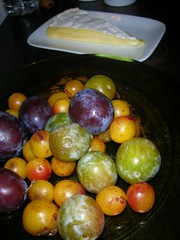Two years ago I stood dumb before my fishmonger, wondering why in the world I wasn’t getting any scallops.
Had I used the wrong word (Coquilles Saint-Jacques)? Had I not ushered the proper greeting? No, I understood after the third repetition: they were not in season.
Not in season? In America I could buy scallops whenever I wanted. But now, on the eve of my first dinner party in France, the pesky bi-valves were nowhere to be found. With Serge and Agnès arriving in less than an hour, I pointed hopefully to some white flesh-looking fish and returned home to struggle with its bones.
Despite the fact that I was raised in the “breadbasket to the world,” I had no sense of seasonality before moving to France. The same items were present year-round from my stadium-sized grocery store. They were cheaper in certain months, but always available.
In France, during that first month, I felt constrained. There were fewer options in smaller stores that seemed never to be open when I needed them. The recipes that had formerly dazzled were, without the right ingredients, of little use to me now.
I had to re-learn how to eat.
Eating in France means following the seasons. My next lesson was the autumn appearance of wild mushrooms. Months later, the arrival of clementines marked time for a city without snow. Oysters burst onto to scene with crowds gathering for free tastings at the local poissonnerie. Within months friends were whispering about springtime lamb and asparagus. And summer, before I knew it, had come 'round again - bringing deep red tomatoes and stacks of fresh herbs.
Last night I cooked again for Serge and Agnès. This time, however, I went about it in a much different way. Gone were the convoluted recipes and fusion acrobatics. In their place, an offering of what’s best in September:
Salad of endive, radicchio, beets, pears, goat cheese, and hazelnut
Roast chicken and potatoes with green beans
Seasonal plums (mirabellle, Reine Claude, quetsche) with a runny Brie de Meaux
When you buy food that’s in season, you don’t have to do much besides put it on a plate. The Brie de Meaux, which had been aged for eight weeks in my butcher’s cave and set out only when it was ready to be eaten that day, was runny and redolent of green summer grass. The plums were at the peak of ripeness – perfect in the moment and rotten the next morning on my counter.
So to paraphrase the Rolling Stones:
You can’t always get what you want
But if you try sometimes to follow the times
You just might find...you get what you need (and more).


5 comments:
And much more…
God damn you and your beautiful Frenchy food.
Jewel's always has "Coquilles Sainte-Jacques."
I hear you there. When I moved to the U.S., I couldn't believe that what I grew up to know as seasonal food would be available all year round. The downside is that it's not as fresh and natural as in France -- even organic food. You never quite know how it's been fed, forced, and "improved". And even in an agricultural State like California, it never has the flavor it has in France, or Italy, where food is fresher because you're closer to the "natural" source. (Whenever I get back to Paris, I get food orgasms every time I eat -- even a simple tomato.) Bottom line is: the longer the food chain, the more industrialized and the less reliable -- but also the more choice you'll have. It's a trade-off.
Hi !
If one is interested in scallops, Amerloque spoke about them just recently:
http://amerloqueparis.blogspot.com/2006/08/perseids.html
* * * * *
"What does Amerloque mean by 'real scallops' ?", the attentive reader may ask. "When is a scallop not 'real' ?"
The fishing village of Port-en Bessin is famed throughout France for its Coquilles Saint Jacques – aka the "scallop". This is the renowned pecten maximus, which is really the only true French variety. Several years ago (1996) the World Trade Organization bureaucrats shamefully decreed that a number of varieties of "scallops" can also bear the name Coquilles Saint Jacques as long as the proper Latin name(s) appeared as well. So nowadays in France one can encounter all kinds of processed and unprocessed "scallops" from all over the world, including but not limited to the following varieties (Amerloque keeps his hit list updated):
pecten novazaelandia
placopecten magellanicus
argopecten purpuratus
chlamys islandica
chlamys nobilis
zygochlamys patagonica
patinopecten yessoensis
Nowadays, in season, if one requests Coquilles Saint-Jacques at the open air markets inland, one might receive any or all of the above, or one might receive a real French scallop, a pecten maximus. Amerloque offers this trip to travelers, a tip not found in the guidebooks: to be certain of obtaining the real French scallop, ask for pecten maximus and accept no substitutes. If one is lucky, the fishmonger's face will light up and an impassioned conversation will begin. Usually s/he will throw in copious advice concerning a suitable recipe, en plus.
Best,
L'Amerloque
I'm so jealous of your brie de meaux! Not available in the US due to young raw milk cheese being illegal.
Post a Comment